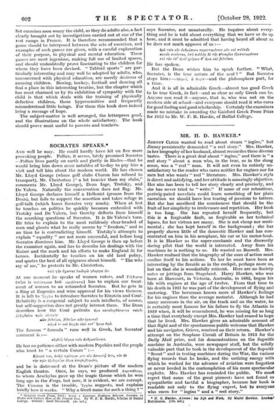SOCRATES SPEAKS.* AND well he may. He could hardly have
hit on five more provoking people. Pollux, it seems, lately promised Socrates —Pollux lives partly on earth and partly in Hades—that he would bring him down some notables of to-day to pay him a visit and tell him about the modern world. He has chosen Mr. Lloyd George (whose golf clubs Charon has refused to transport), Mr. Chesterton (" a lot heavier than my clubs," comments Mr. Lloyd George), Dean Inge, Trotsky, and De Valera. Naturally the conversation does not flag. Mr. Lloyd George declares himself a Hellenist (groans from the Dean), but fails to support the assertion and takes refuge in golf-talk (which bores Socrates very much). When at last he touches on politics he quickly becomes embroiled with Trotsky and De Valera, but thereby deflects from himself the searching questions of Socrates. It is De Valera's turn. He tries to explain to the most ruthlessly clear-headed of men and ghosts what he really means by " freedom," and in no time he is contradicting himself. Trotsky's attempts to explain " equality " are not more successful, and before long Socrates dismisses him. Mr. Lloyd George is then up before the examiner again, and has to describe his dealings with the Kaiser and the mark and his efforts to make England fit for heroes. Incidentally he touches on his old land policy, and quotes the best of all epigrams about himself. " The wits say of me," he protests to Mr. Chesterton,
robs 7fp, looms Noaopa •ylcoryos
At one moment he speaks of women voters, and rAt9epros (who is roVaapsos but KopPOraros) has to explain our treat- ment of women to an astounded Socrates. But he gets in a fling at Eugenics and wins approval for his views thereon. It is left to Irytas to introduce Socrates to Einstein and Coue. Relativity is a congenial subject to such intellects, of course, but self-suggestion does not greatly interest them. The Dean describes how the Cone patients Atm xara3apeciPO2TEt 7010.6e km:yarn:r& rpOs eaurocls•
REXricov, 13eXrtoy ally ?payroll
re Kai }Pyxis, elpt mar' &cap 17(1 The famous " formula " runs well in Greek, but Socrates' comment is :— etr*Oeis X1-/ELI robs dveponricrKovs.
He has no patience either with modern Psychics and the people who trust to " a certain Conan " Bovwvt ny[, (WA rpOrepoo p12 of m ciouverii 15,71, vim SE rite rply 145epsfav Aws cro,30X7p,Ort, and he is distressed at the Dean's picture of the modern English theatre. Once, he says, we produced Aoperd/erns, to whom Aeschylus gave up the tragic throne which he won long ago in the Frogs, but now, it is evident, we are corrupt. The Cinema is the trouble, 'Iryfas suggests, and explains briefly how it works. " Why a Greek name for such a thing ? "
• Gnieford Greek Prose, 1922 ; being a Lusitatic Diakpae between Socrates in Hades and Certain Men of the Present Day. By W. F. N. Hardie, Scholar of Balliol College. Oxford ; Basil Blackwell. Les. net.] says Socrates, not unnaturally. He inquires about every.. thing and he is told about everything that we have or do up here, and it must be admitted that having heard all about us he does not much approve of us :— Spar rat ciPeptbrour raparropbovs ihav Kat IroXXois saKas cyrOyras, is--tt roXXig 31 rho eAvapfus aarargairous sal ray br' xcipovs 8' ape ma! peXr(ove.
He has spoken.
But the Dean wishes him to speak further. " What, Socrates, is the true nature of the soul ? " But Socrates stops him :—foewLe7, d °vire—and the philosophers part, for a time.
And it is all in admirable Greek—almost too good Greek to be true Greek, in fact—and as clear as only Greek can be. Anyone can read it—anyone, that is, who was not on the modern side at school—and everyone should read it who cares for good fooling and good scholarship. Certainly the examiners made no mistake in awarding the Gaisford Greek Prose Prize for 1922 to Mr. W. F. R. Hardie, of Balliol College.










































 Previous page
Previous page